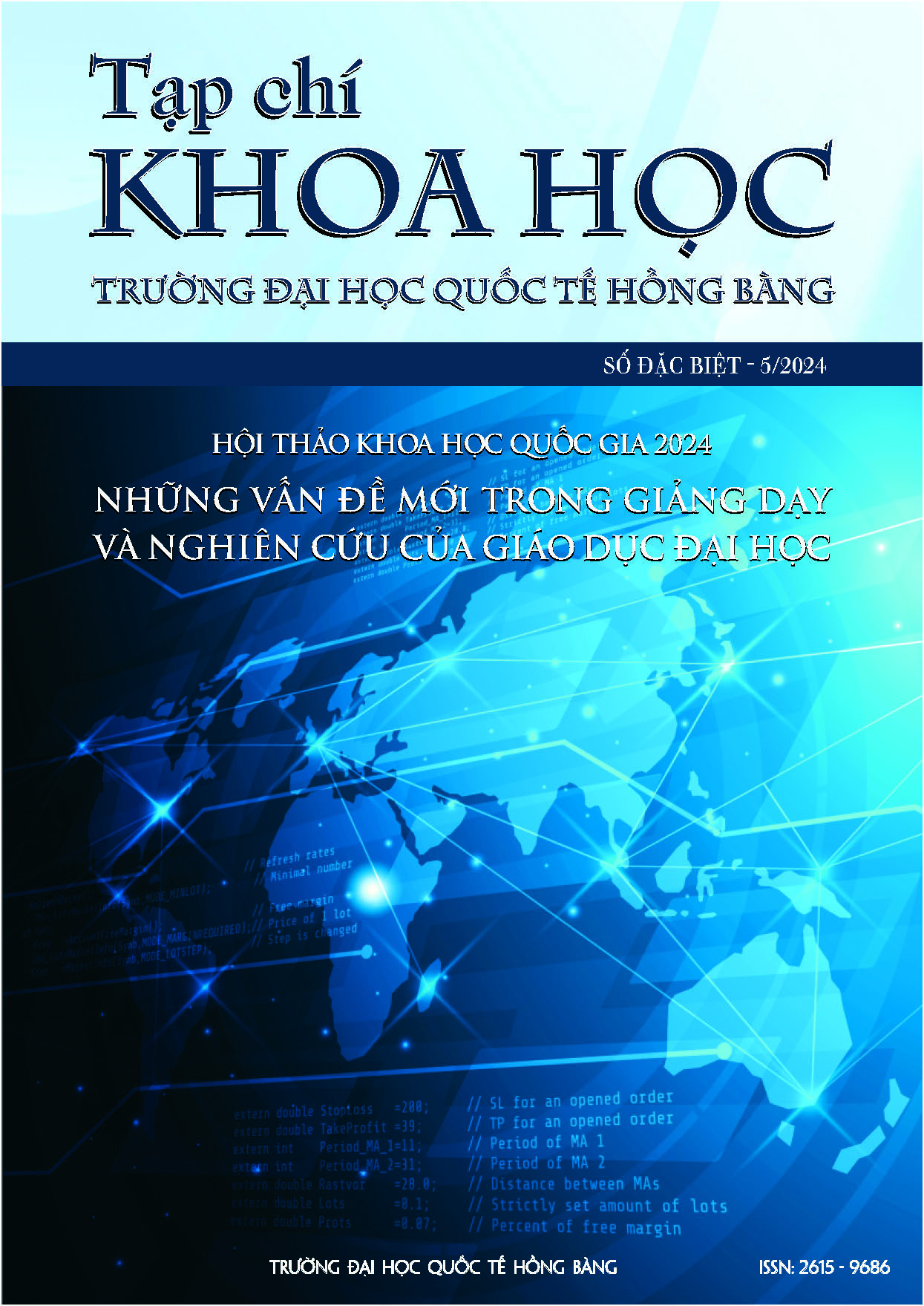CÁC YẾU TỐ ẢNH HƯỞNG ĐẾN Ý ĐỊNH ÁP DỤNG TRÒ CHƠI HỌC TẬP TRONG HOẠT ĐỘNG GIẢNG DẠY CỦA GIẢNG VIÊN TẠI MỘT SỐ TRƯỜNG ĐẠI HỌC Ở THÀNH PHỐ HỒ CHÍ MINH
Các tác giả
DOI: https://doi.org/10.59294/HIUJS.KHQG.2024.014Từ khóa:
trò chơi học tập, nhận thức tính hữu ích, nhận thức tính dễ sử dụng, nhận thức tính thú vị.Tóm tắt
Trong thời kỳ bùng nổ của cuộc cách mạng khoa học và công nghệ ngày nay, thuật ngữ “trò chơi học tập” thu hút sự quan tâm của nhiều nhà nghiên cứu và một số tác động tích cực của hoạt động này cũng đã được khẳng định. Nghiên cứu này nhằm khám phá các yếu tố ảnh hưởng đến ý định ứng dụng “trò chơi học tập” trong hoạt động giảng dạy của giảng viên ở một số trường đại học ở Thành phố Hồ Chí Minh. Phương pháp nghiên cứu định tính được thực hiện với việc phỏng vấn sâu 5 giảng viên để điều chỉnh thang đo, bảng hỏi. Sau đó, kết quả phân tích dữ liệu khảo sát bằng PLS-SEM từ 300 giảng viên đã cho thấy nhận thức tính hữu ích, nhận thức tính dễ sử dụng đều có tác động tích cực đến thái độ của giảng viên. Bên cạnh đó, thái độ của giảng viên đóng vai trò quan trọng đối với ý định áp dụng hoạt động trò chơi hóa trong hoạt động giảng dạy. Các phát hiện này đã đóng góp vào việc hiểu rõ hơn về việc áp dụng công nghệ trong giảng dạy để từ đó đưa ra các đề xuất nhằm tối ưu hóa hoạt động này trong công tác giảng dạy.
Abstract
During the current era of scientific and technological advancements, the concept of "learning games" has become a subject of interest for many researchers. Some positive effects of this activity have also been confirmed. This study explores the factors that influence lecturers' intention to use "learning games" in their teaching activities in certain universities in Ho Chi Minh City. Qualitative research methods were employed, and in-depth interviews were conducted with five lecturers to refine the questionnaire. Later, the survey data analysis by the PLS-SEM tool of 300 lecturers indicated that the perception of usefulness and ease of use positively impacted the teachers' attitude towards gamification activities. Moreover, the teacher's attitude played a crucial role in their intention to implement gamification activities in their teaching. These findings provide better insights into the application of technology in teaching and offer recommendations to optimize this activity in teaching.
Tài liệu tham khảo
[1] A. Rajšp, T. Beranič, and M. Heričko, “Students’ Perception of Gamification in Higher Education Courses,” 2017.
[2] V. Thi Xuan Anh, P. Thi Hoai, H. Thanh Thanh, and P. Thi Hoai -, “The Application Of Quizizz Games On Students’ Mobile Phones In English Classrooms At Van Lang University,” Journal of Science Ho Chi Minh City University of Education, 2021.
[3] Y. Wang, “A comparative study of Chinese and American preservice teachers’ intention to teach online based on the Theory of Planned Behavior,” Educ Inf Technol (Dordr), vol. 28, no. 6, pp. 6391–6405, Jun. 2023, doi: 10.1007/s10639-022-11442-5.
DOI: https://doi.org/10.1007/s10639-022-11442-5[4] F. D. Davis, “A technology acceptance model for empirically testing new end-user information systems: Theory and results,” 1985.
[5] A. Sanchez-Mena, J. Marti-Parreño, J. Aldás-Manzano, A. Sánchez-Mena, and J. Martí-Parreño, “The Role of Perceived Relevance and Attention in Teachers’ Intention to use Gamification,” European Conference on e-Learning, pp.615, 2016. [Online]. Available: https://www.researchgate.net/publication/312099037
[6] Z. Turan, S. Kucuk, and S. C. Karabey, “Investigating Pre-Service Teachers’ Behavioral Intentions to Use Web 2.0 Gamification Tools,” Participatory Educational Research, vol. 9, no. 4, pp. 172–189, 2022, doi: 10.17275/per.22.85.9.4.
DOI: https://doi.org/10.17275/per.22.85.9.4[7] H. Holden and R. Rada, “Understanding the Influence of Perceived Usability and Technology Self-Efficacy on Teachers,” Journal of Research on Technology in Education, vol. 43, no. 4, pp. 343-367, 2011.
DOI: https://doi.org/10.1080/15391523.2011.10782576[8] T. Teo, M. Zhou, A. C. W. Fan, and F. Huang, “Factors that influence university students’ intention to use Moodle: a study in Macau,” Educational Technology Research and Development, vol. 67, no. 3, pp. 749–766, Jun. 2019, doi: 10.1007/s11423-019-09650-x.
DOI: https://doi.org/10.1007/s11423-019-09650-x[9] Y. Yang and X. Wang, “Modeling the intention to use machine translation for student translators: An extension of Technology Acceptance Model,” Computer Education, vol. 133, pp. 116–126, May 2019, doi: 10.1016/j.compedu.2019.01.015
DOI: https://doi.org/10.1016/j.compedu.2019.01.015[10] V. Venkatesh and F. D. Davis, “Theoretical extension of the Technology Acceptance Model: Four longitudinal field studies,” Management Science, vol. 46, no. 2, pp. 186–204, 2000, doi: 10.1287/mnsc.46.2.186.11926.
DOI: https://doi.org/10.1287/mnsc.46.2.186.11926[11] F. D. Davis, “Perceived usefulness, perceived ease of use, and user acceptance of information technology,” MIS Q, vol. 13, no. 3, pp. 319–339, 1989, doi: 10.2307/249008.
DOI: https://doi.org/10.2307/249008[12] G. K. W. Wong, “The behavioral intentions of Hong Kong primary teachers in adopting educational technology,” Educational Technology Research and Development, vol. 64, no. 2, pp. 313–338, Apr. 2016, doi: 10.1007/s11423-016-9426-9.
DOI: https://doi.org/10.1007/s11423-016-9426-9[13] J. F. Hair, L. M. Matthews, R. L. Matthews, and M. Sarstedt, “PLS-SEM or CB-SEM: updated guidelines on which method to use ‘PLS-SEM or CB-SEM: updated guidelines on which method to use,’” 2017.
DOI: https://doi.org/10.1504/IJMDA.2017.10008574[14] C. Höck, C. M. Ringle, and M. Sarstedt, “Management of multi-purpose stadiums: importance and performance measurement of service interfaces,” 2010. [Online]. Available: www.smartpls.de.
DOI: https://doi.org/10.1504/IJSTM.2010.034327Tải xuống
Tải xuống: 420











